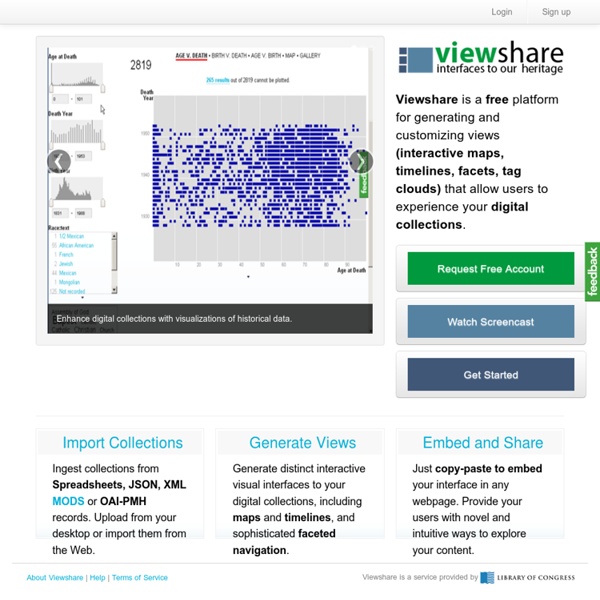



Visualizing Del.icio.us Roundup I have been coming across many del.icio.us tools to visualize usage during my daily researching hours. So many, that I have decided to start making note of the ones I come across. From the span of about two weeks, I have been collecting as many as I could find. There’s a couple more that I have in mind, but they don’t seem to be working at the moment. EtherPad: Realtime Collaborative Text Editing COAR – Greater visibility and application of research through global networks of Open Access repositories Bime - Analytics & Dashboards | SAAS Business Intelligence | From startup to fortune 500 Accessibility, fair pricing, infinite scalability, premium support. There is something for everyone in here. From web analysts to CFOs Whether you are a web analyst, in marketing, financial accountant or anything else, turn your data into actionable information. Power pack From a full-blown Business Intelligence stack to extending your existing one. WEBINAR: Introduction to BIME An introduction to BIME which will provide attendees with everything they need to know to start building stunning dashboards and doing data discovery. Thursday 10th of April 2014 at 11:00 EDT WEBINAR: How E-Commerce becomes Smart Commerce Learn how to use cloud BI to do an in-depth analysis of your online sales channels - from websites to widgets and apps. Thursday 17th of April 2014 at 11:00 EDT Including connectors for Google BigQuery, relational databases, spreadsheets, flat files, OLAP engines, Google Analytics, Facebook Insights, Salesforce CRM and Google Spreadsheets...
TypeWith.me: Live Text Document Collaboration! SDB Digital Preservation » Challenges Ensuring long term access to the vast range of information required for archiving is a huge problem that organisations are slowly waking up to. The key challenges are: Media obsolescence. Information is held on unmanaged local stores (e.g laptops, optical media, local file servers) or central stores where its value is not recognised (central file servers, tape back-ups). In each case data can be lost because the media on which it is stored becomes unreadable or is replaced.Distributed and disjointed data. These challenges pose a significant barrier to implementing a successful digital archiving policy and must be confronted before selecting your preferred approach.
7 Essential Books on Data Visualization & Computational Art by Maria Popova What 12 million human emotions have to do with civilian air traffic and the order of the universe. I’ve spent the past week being consistently blown away at the EyeO Festival of data visualization and computational arts, organized by my friend Jer Thorp, New York Times data artist in residence, and Dave Schroeder of Flashbelt fame. While showcasing their mind-blowing, eye-blasting work, the festival’s all-star speakers have been recommending their favorite books on the subject matter, so I’ve compiled the top recommendations for your illuminating pleasure. Enjoy. Processing, the open-source programming language and integrated development environment invented by Casey Reas and Ben Fry in 2001, is easily the most fundamental framework underpinning the majority of today’s advanced data visualization projects. Recommended by: Casey Reas Reviewed in full here. Recommended by: Jer Thorp Recommended by: Moritz Stefaner Recommended by: Wes Grubbs China: The Wu Family Donating = Loving
Business-en-trade Using OAI-ORE to Transform Digital Repositories into Interoperable Storage and Services Applications By David Tarrant, Ben O’Steen, Tim Brody, Steve Hitchcock, Neil Jefferies and Leslie Carr Introduction One of the main decisions to be made when starting a digital repository is which software to use. The starting point for our work was an investigation into institutional repository (IR) preservation services by the JISC-funded Preserv 2 project [25], which wanted to find a way of effectively replicating a whole IR across any repository platform. The OAI-ORE specification includes approaches for representing digital objects and facilitates access and ingest of these representations beyond the borders of hosting repositories, enabling a new generation of cross-repository services. This paper describes an award-winning [27] rapid development project, entered into a competition [23] sponsored by the Common Repository Interface Group (CRIG) [5] at the Open Repositories Conference 2008 [21]. We also look briefly at possibilities for further work in this area. A quick overview of OAI-ORE